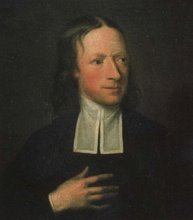The Trustees
The Trustees, in consequence of Oglethorpe's
representations, were anxious to engage eligible men
to go out to Georgia in order to convert the Indians,
and to officiate as ministers at Savannah and a new town
about to be built on the Island of St. Simon's. Oglethorpe,
as we have seen, was acquainted with the Wesley
family, but he had not sufficient knowledge of either
John or Charles to judge of thejr fitness for the required
duties. John Wesley., now in his thirty-second
year, was a Fellow of Lincoln College, Oxford, and
Charles, aged twenty-six, a student of Christ Church.
They had attained notoriety at the University by the
strictness of their conduct ; and, as they and their
select associates lived according to certain rules of
their own, were called ' Methodists.'
Charles Wesley was completely led by his elder brother;
and John's notions were so peculiar that his pious and
learned father, when within a few months of the grave,
confessed — "I sat myself down to try if I could unravel
his sophisms, and hardly one of his assertions appeared
to me to be universally true."* However, the Rev.
Doctor Burton, a Member of the Board, who knew
John Wesley well, considered that from his abstemious-?
ness and readiness to endure hardship he was well
suited for the office of a missionary ; and in August,
1735, learning that he was in London, brought him to
Mr. Oglethorpe's house, that they might talk the matter
over. Wesley at first hesitated, but many of his
friends advised him to accept the offer, and as even his
widowed mother encouraged him to it, he at length
consented. f It was eventually determined that his
brother Charles should accompany him, also Benjamin
Ingham, one of the Oxford association, and Charles
Delamotte, the son of a London merchant.
A Memoir of General James Oglethorpe
By Robert Wright
Published 1867
Chapman and Hall Prisons
414 pages
Original from the New York Public Library
Digitized Jul 11, 2007
p. 92-93
representations, were anxious to engage eligible men
to go out to Georgia in order to convert the Indians,
and to officiate as ministers at Savannah and a new town
about to be built on the Island of St. Simon's. Oglethorpe,
as we have seen, was acquainted with the Wesley
family, but he had not sufficient knowledge of either
John or Charles to judge of thejr fitness for the required
duties. John Wesley., now in his thirty-second
year, was a Fellow of Lincoln College, Oxford, and
Charles, aged twenty-six, a student of Christ Church.
They had attained notoriety at the University by the
strictness of their conduct ; and, as they and their
select associates lived according to certain rules of
their own, were called ' Methodists.'
Charles Wesley was completely led by his elder brother;
and John's notions were so peculiar that his pious and
learned father, when within a few months of the grave,
confessed — "I sat myself down to try if I could unravel
his sophisms, and hardly one of his assertions appeared
to me to be universally true."* However, the Rev.
Doctor Burton, a Member of the Board, who knew
John Wesley well, considered that from his abstemious-?
ness and readiness to endure hardship he was well
suited for the office of a missionary ; and in August,
1735, learning that he was in London, brought him to
Mr. Oglethorpe's house, that they might talk the matter
over. Wesley at first hesitated, but many of his
friends advised him to accept the offer, and as even his
widowed mother encouraged him to it, he at length
consented. f It was eventually determined that his
brother Charles should accompany him, also Benjamin
Ingham, one of the Oxford association, and Charles
Delamotte, the son of a London merchant.
A Memoir of General James Oglethorpe
By Robert Wright
Published 1867
Chapman and Hall Prisons
414 pages
Original from the New York Public Library
Digitized Jul 11, 2007
p. 92-93
Subscribe to:
Post Comments (Atom)

No comments:
Post a Comment